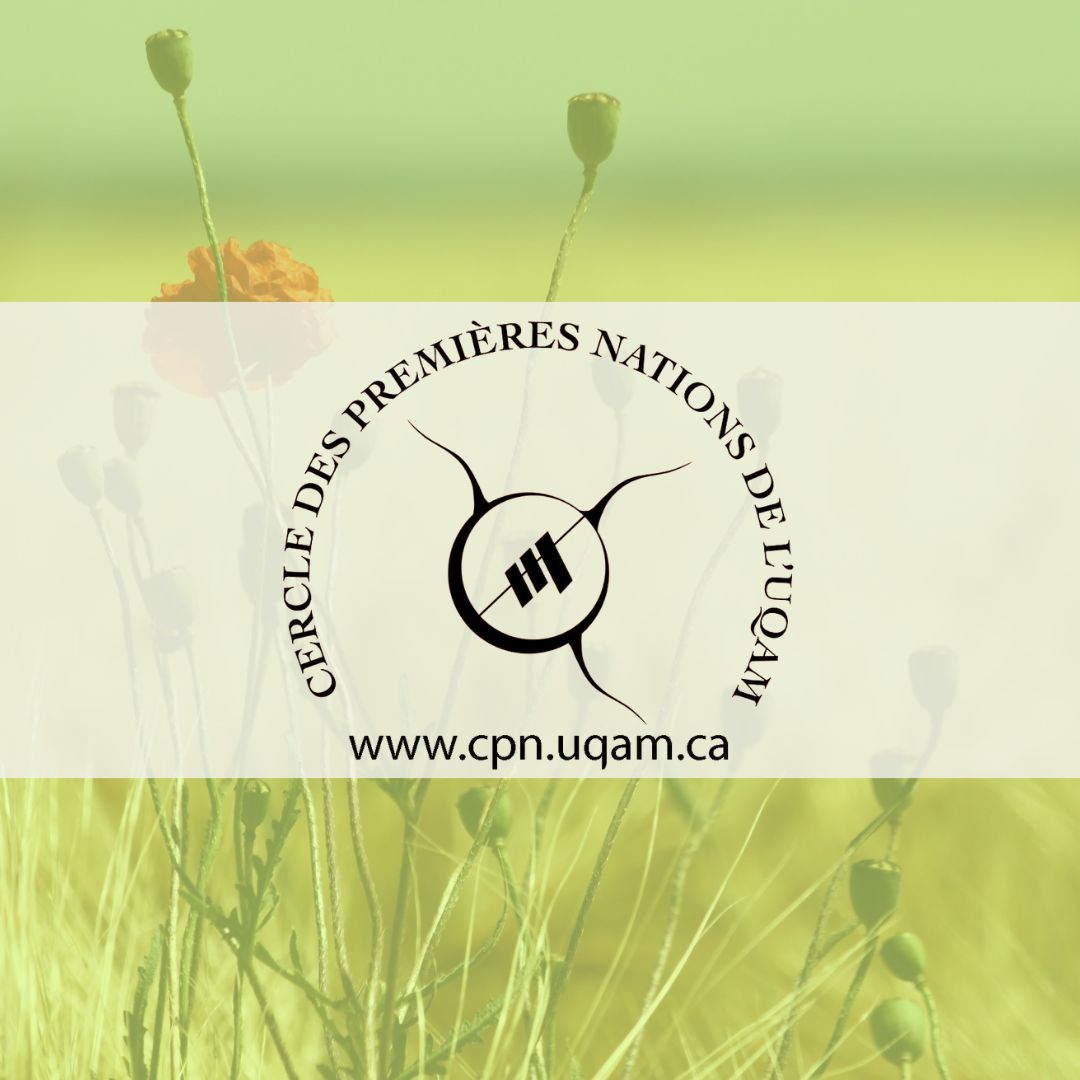Round Table: Indigenous Art and Activism
Kwé, Kuei, Hello !!!
Event also live on Zoom; link: https://uqam.zoom.us/j/86786817373
November 21, 2024
6 pm – 7:30 pm
315 Sainte-Catherine Street East
Local R-M130, Metro level, UQAM
Organized by : UQAM First Nations Circle
On our website: https://cpn.uqam.ca/
Contact: cpn@uqam.ca

Open to all! Free admission!
The First Nations Circle of UQAM (CPNUQAM), the Centre interuniversitaire d’études et de recherches autochtones (CIERA), the Groupe de recherche interdisciplinaire sur les affirmations autochtones contemporaines (GRIAAC) with the collaboration of UQAM’s Sociology Department invite you to this round table: Indigenous Art and Activism, The Cercle des Premières Nations de l’UQAM (CPNUQAM), the Centre interuniversitaire d’études et de recherches autochtones (CIERA), the Groupe de recherche interdisciplinaire sur les affirmations autochtones contemporaines (GRIAAC) with the collaboration of UQAM’s Sociology Department, invite you to this round table: Indigenous Art and Activism.
Art, in its various forms, is an essential component of political engagement. Creative practices offer a powerful means of influencing representations, reshaping political discourses and mobilizing support. Art makes it possible to question dominant narratives and imagine alternatives. Among Canada’s Indigenous, art can be seen as an intrinsic form of resistance to colonialism. In a context marked by assimilation and cultural erasure, Indigenous art plays a part in revitalizing knowledge and cultural forms. Creative practices thus become acts of commitment that are not limited to individual expression, but also serve to affirm cultural and social identities.
This panel discussion will highlight the intersections between art and activism among Indigenous peoples, exploring how artistic practices are used to challenge power structures and advocate for social change. Through the work of three renowned Indigenous artists, she will offer a reflection on Western visions of art and activism, while opening the way to new perspectives.
Caroline Monnet hails from the Outaouais region. Born to an Anishinaabe mother and a French father, she is currently based in Mooniyang/Montreal. Since graduating from the University of Ottawa and the University of Granada in Spain, she has pursued a career in visual arts and film. Her work is regularly exhibited internationally and is part of prestigious collections, including that of Unesco in Paris. Ms. Monnet is known for her minimalist, yet emotionally charged work, which uses industrial materials and combines the vocabularies of popular and traditional visual cultures with the tropes of modernist abstraction to create singular hybrid forms. She is represented by galerie Blouin-Division.
Guy Sioui Durand introduces himself in Wendat as follows: Guy Tsie8ei 8enho8en yatshih, Wendat endi’, Yanariskwa’ iwayitiohkou’tenh,
Wendake ekwayehtih, Teyiatontariye indare.
Tsikwawendorenh’.
A Wendat (Huron) originally from Wendake, Guy Sioui Durand is a member of the Wolf clan. He sees himself as a bearer and transmitter of knowledge, know-how and ways of living together. A sociologist (PH.D.), art critic, independent curator, teacher, renowned lecturer and performer, Mr. Sioui also creates performative harangues expressing orality. He looks at both Aboriginal and contemporary art. On the one hand, he emphasizes the decolonization of minds through the rewilding of our imaginations and the renewal of relationships. On the other, he believes in changing the world through art, and art through living Aboriginal art, provided the spectacular is opposed to the spectacle.
Andrea Ottawa is an Atikamekw iskwew from Manawan. A health care worker, she now lives off-reserve. In her spare time, she runs a small business selling skirts, t-shirts, stickers, tikinakan, beaded jewelry, regalias and other ceremonial dresses that she makes herself. She also organizes and leads workshops on tradition/culture, skateboarding, wellness and youth issues.
Edith-Anne Pageot is a professor in the Department of Art History at UQAM. She co-directed the first online course on Aboriginal art, Ohtehra’, l’art autochtone aujourd’hui, a collaboration between UQAM and the Montreal Museum of Fine Arts. She is the author of Le Collège Manitou. Renouveau artistique et médiatique autochtone, PUM (in bookstores March 17, 2025).
The conference will be moderated by Elisa Tripotin.
Elisa Tripotin is a doctoral student in the Sociology Department at UQAM, focusing on urban aboriginal activism. In charge of the Sociology of Indigenous in Canada course, she is co-organizing this round table with the aim of making Indigenous voices more visible in universities.
Need support?
Are you an Indigenous person in Tiohtià:ke?
The NETWORK creates content regularly to help you connect with the community, discover opportunities in the city, and find resources that will answer your specific needs.
Consult our various sections to learn more.

